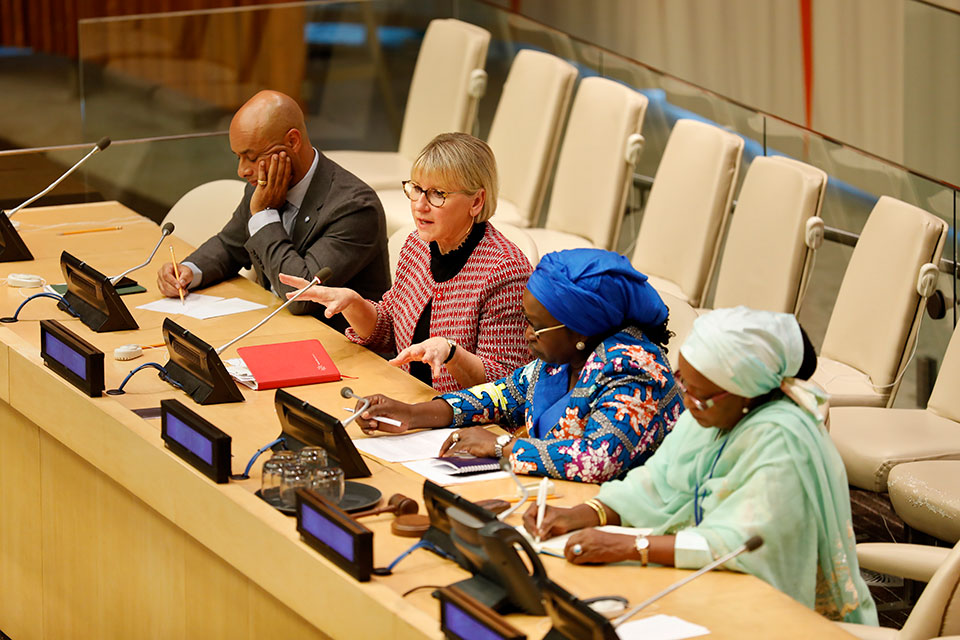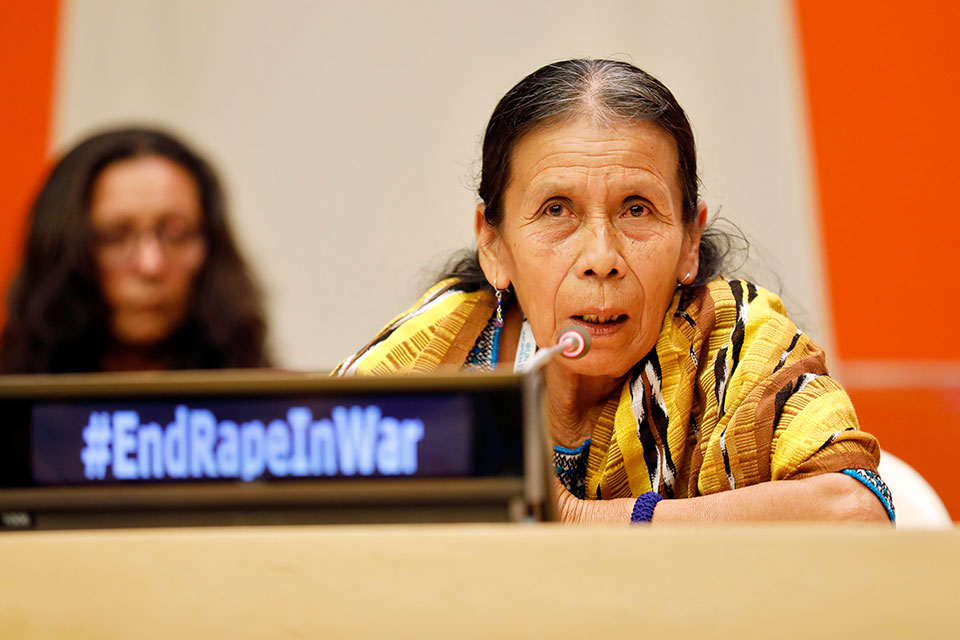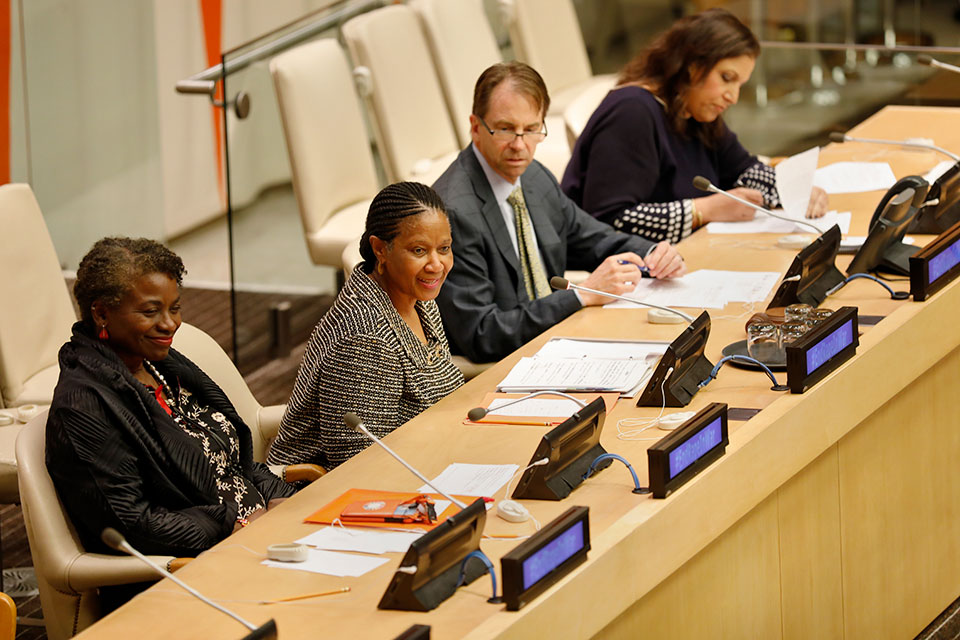Ten years on from mandate on sexual violence in conflict, survivors and experts call for promises to be fulfilled
Date:

On the margins of the annual UN Security Council Open Debate on Women, Peace and Security in New York, at a side event on 30 October, survivors, leaders and experts came together to commemorate the 10th anniversary of the establishment of the mandate of the Special Representative of the Secretary-General on Sexual Violence in Conflict.
“Seize this moment to set the stage for a new decade of decisive action to remove sexual violence from our daily headlines and relegate it – once and for all – to the annals of history,” said Pramila Patten, the UN’s Special Representative of the Secretary-General on Sexual Violence in Conflict.
The Mandate on Sexual Violence in Conflict, established in 2009, is dedicated to preventing and addressing conflict-related sexual violence, and through the unanimous adoption of Security Council resolution 1888 (2009) also recognized that sexual violence constitutes a threat to global peace and security, and created the office of the Secretary-General’s Special Representative on Sexual Violence in Conflict.
“The creation of this mandate a decade ago reflected the UN’s commitment to highlight, prevent and seek justice for this crime,” said UN Deputy Secretary General Amina Mohammed. “It also sent a clear message that the sexual violence that happens during times of upheaval and conflict is not the inevitable collateral of war, but a horrific violation of human rights and international law.”
In the decade since its creation, significant normative, institutional and operational progress has been made. This milestone anniversary provided a chance to take stock of what has enabled progress and set the stage for the next decade of action, with a focus on listening to and supporting survivors and implementation of existing commitments.
“We really have to make a move from words to deeds,” said Margot Wallstrom, Former Special Representative of the Secretary-General on Sexual Violence in Conflict. “We owe it to all of the women who have shared their stories and rebuilt their lives.”
Another former Special Representative of the Secretary-General on Sexual Violence in Conflict, Zainab Hawa Bangura, added that adequate funding is a critical part of meeting the implementation goals.
“National governments need to look at this not as a women’s rights issue, but as a cross-cutting issue,” Ms. Bangura said. “And then allocate enough money to deal with this issue.”
The event put survivors’ voices and stories at the centre. Survivors of sexual violence in conflict from around the world shared their testimonies and called for justice and reparations.

Demecia Yat, a survivor of sexual violence during Guatemala’s internal armed conflict, spoke about the importance of listening to survivors and learning from them. As one of the Abuelas (grandmothers) of Sepur Zarco, Yat and other indigenous women took their case to the highest court of Guatemala in 2011. The groundbreaking case resulted in the conviction of two former military officers of crimes against humanity and granted 18 reparation measures to the women survivors and their community.
“We don’t want history to repeat itself. We want to progress so that our children and grandchildren don’t experience this,” Yat said. “We must work for peace and justice."
Other survivors who spoke at the event, echoed the sentiment, and called for better support to fulfil the commitments made to them, including towards justice and reparations.
“For 20 years now, we have heard promises. Promises to put an end to war, promises that victims will be recognized, promises that perpetrators will be arrested and sentenced…” said a survivor from the Democratic Republic of Congo. “I can promise you that [the victims] are not looking for pity. What they need is for these promises to become a reality.”
Another survivor, from Sinjar, Iraq, called for accountability: “When I was 14, I was kidnapped by ISIS. I was separated from family. ISIS took us prisoners, they tortured us… for three long years.”
“Those criminals were not held accountable.”
During the event, Ms. Patten, together with Nobel Laureates Dr. Denis Mukwege and human rights activist Nadia Murad, launched a new Global Fund for Survivors, which will provide support for survivors of conflict-related sexual violence around the world, including assistance to governments willing to set up their own reparation schemes. The governing Board of the Fund will include survivors, civil society organizations and frontline service providers, who will work with governments.
“The Global Fund for Survivors will transform the lives of thousands of survivors and their families,” said Nobel Laureate Nadia Murad. “What makes it truly unique is that it’s 100 per cent survivor-centred.”
“Survivors need to be part of the solution. Reparations are a right… and they serve to help survivors heal.”
“Today, what we had once seen as an inevitable consequence of war is seen as something that can be prevented,” said Dr. Denis Mukwege. “It’s been ten years that we have been asking for compensation for victims of [conflict-related] sexual violence. The Global Fund for Survivors is a significant achievement.”

UN Women Executive Director Phumzile Mlambo-Ngcuka echoed the support for survivors, and emphasized the need urgent progress.
“Right now there is a radical impatience that exists within all of us for better results and more impact,” said Ms. Mlambo-Ngcuka.
Looking ahead to the next decade, Ms. Mlambo-Ngcuka affirmed UN Women’s commitment to promoting access to justice for victims, as well as holistic support for survivors.